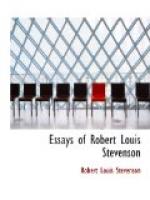of Life. And our sages give us about the best
satisfaction in their power when they say that it is
a vapour, or a show, or made out of the same stuff
with dreams.[13] Philosophy, in its more rigid sense,
has been at the same work for ages; and after a myriad
bald heads have wagged over the problem, and piles
of words have been heaped one upon another into dry
and cloudy volumes without end, philosophy has the
honour of laying before us, with modest pride, her
contribution towards the subject: that life is
a Permanent Possibility of Sensation.[14] Truly a
fine result! A man may very well love beef, or
hunting, or a woman; but surely, surely, not a Permanent
Possibility of Sensation. He may be afraid of
a precipice, or a dentist, or a large enemy with a
club, or even an undertaker’s man; but not certainly
of abstract death. We may trick with the word
life in its dozen senses until we are weary of tricking;
we may argue in terms of all the philosophies on earth,
but one fact remains true throughout—that
we do not love life, in the sense that we are greatly
preoccupied about its conservation; that we do not,
properly speaking, love life at all, but living.
Into the views of the least careful there will enter
some degree of providence; no man’s eyes are
fixed entirely on the passing hour; but although we
have some anticipation of good health, good weather,
wine, active employment, love, and self-approval,
the sum of these anticipations does not amount to
anything like a general view of life’s possibilities
and issues; nor are those who cherish them most vividly,
at all the most scrupulous of their personal safety.
To be deeply interested in the accidents of our existence,
to enjoy keenly the mixed texture of human experience,
rather leads a man to disregard precautions, and risk
his neck against a straw. For surely the love
of living is stronger in an Alpine climber roping
over a peril, or a hunter riding merrily at a stiff
fence, than in a creature who lives upon a diet and
walks a measured distance in the interest of his constitution.
There is a great deal of very vile nonsense talked
upon both sides of the matter: tearing divines
reducing life to the dimensions of a mere funeral
procession, so short as to be hardly decent; and melancholy
unbelievers yearning for the tomb as if it were a world
too far away. Both sides must feel a little ashamed
of their performances now and again when they draw
in their chairs to dinner. Indeed, a good meal
and a bottle of wine is an answer to most standard
works upon the question. When a man’s heart
warms to his viands, he forgets a great deal of sophistry,
and soars into a rosy zone of contemplation. Death
may be knocking at the door, like the Commander’s
statue;[15] we have something else in hand, thank
God, and let him knock. Passing bells are ringing
all the world over. All the world over, and every
hour,[16] someone is parting company with all his aches
and ecstasies. For us also the trap is laid.
But we are so fond of life that we have no leisure
to entertain the terror of death. It is a honeymoon
with us all through, and none of the longest.
Small blame to us if we give our whole hearts to this
glowing bride of ours, to the appetites, to honour,
to the hungry curiosity of the mind, to the pleasure
of the eyes in nature, and the pride of our own nimble
bodies.




